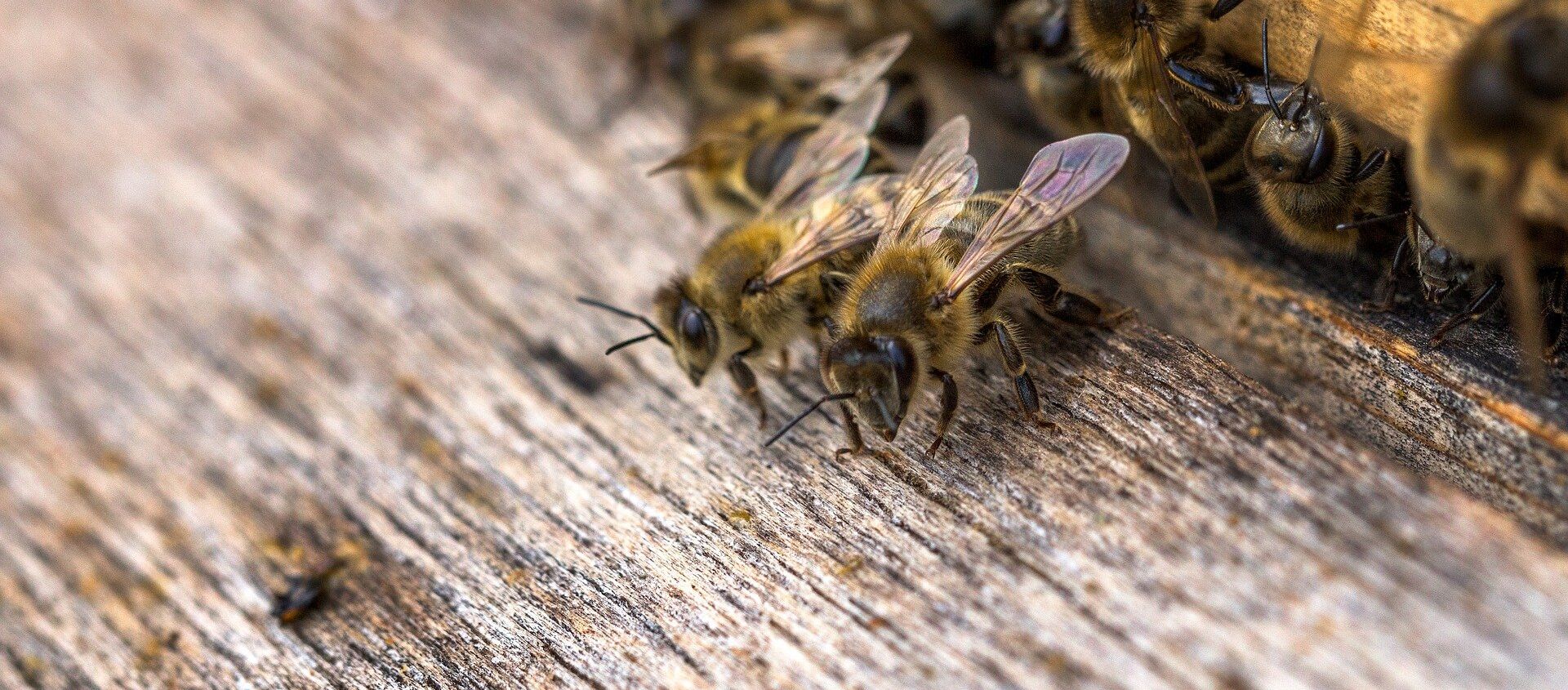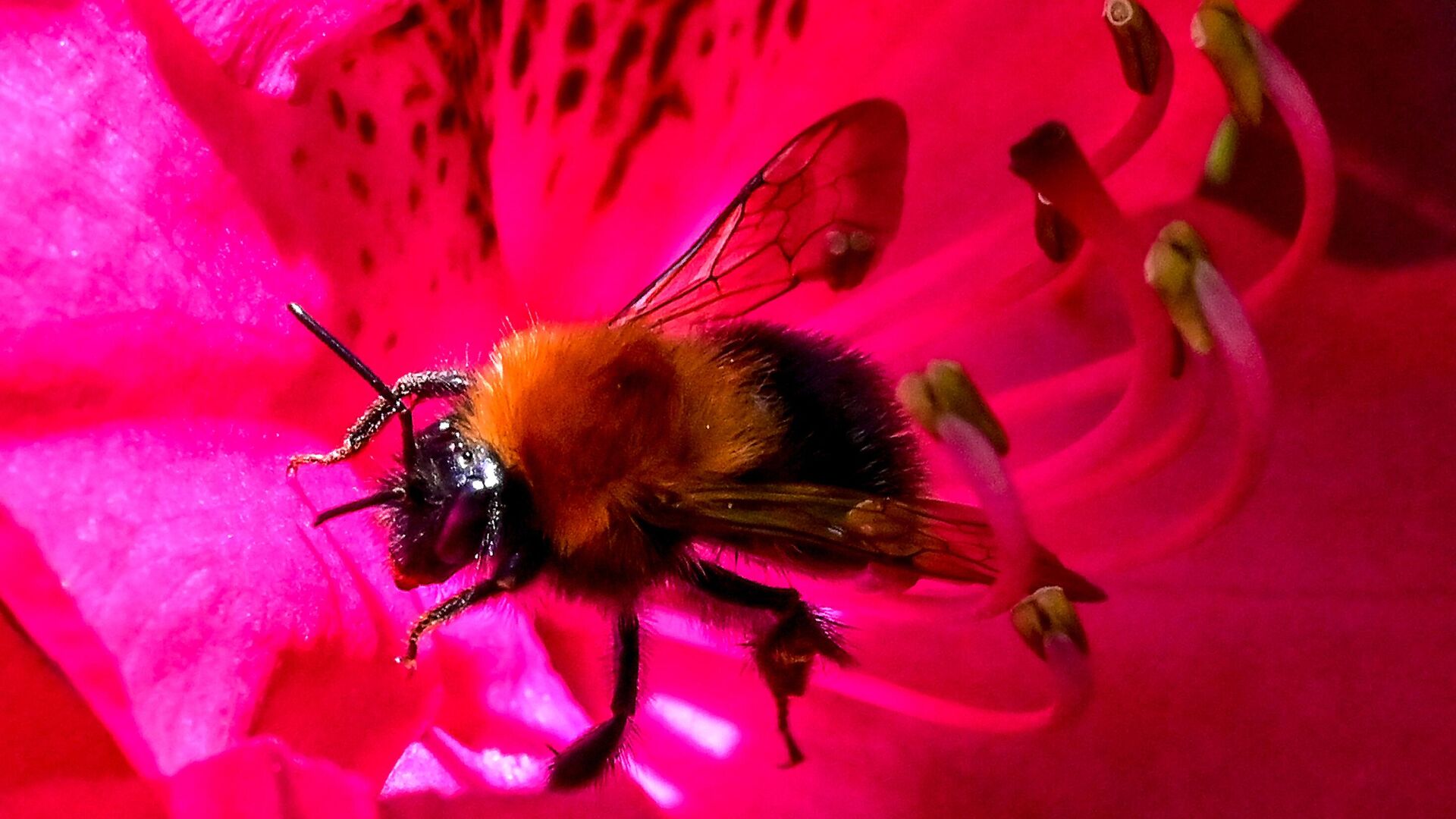https://sputnikglobe.com/20230308/copy-that-bumblebees-learn-to-solve-puzzles-by-imitating-peer-behavior-1108167663.html
Copy That: Bumblebees Learn to Solve Puzzles by Imitating Peer Behavior
Copy That: Bumblebees Learn to Solve Puzzles by Imitating Peer Behavior
Sputnik International
The finding suggests that insects are far smarter than we believe. It is theorized that they can even have emotions like us.
2023-03-08T08:00+0000
2023-03-08T08:00+0000
2023-03-08T08:00+0000
science & tech
flying insects
bumblebees
https://cdn1.img.sputnikglobe.com/img/07e7/03/08/1108168348_0:198:2939:1851_1920x0_80_0_0_ca0f33da62efef6c63380ff5b1e4b7e4.jpg
Bumblebees can learn from each other, a new study published in PLOS Biology shows. Scientists trained one bumblebee to solve puzzle: the insect needed to open a box by rotating a lid clockwise or counterclockwise to access a sugary treat, while the other bumblebees were left watching their peer.The research team filmed several bumblebee colonies for 6 to 12 days and found out that the colonies with a trained insect opened more boxes than control colonies, using the trained peer technique 98.6 percent of the time. The control colonies were left without trained bumblebee and showed poor performance at performing the same task.Previously scientists believed that only higher animals can learn.Researchers stress that their finding is a reason to reconsider human attitudes towards bumblebees and admit that they are "far smarter creatures than a lot of people give them credit for."Scientists believe that bumblebees even possess emotions and can recognize themselves as unique entities distinct from other insects. However, right now it is more of a hunch that needs to be proved.
https://sputnikglobe.com/20200207/bumblebee-populations-on-the-decline-due-to-climate-change---study-1078258836.html
Sputnik International
feedback@sputniknews.com
+74956456601
MIA „Rossiya Segodnya“
2023
Sputnik International
feedback@sputniknews.com
+74956456601
MIA „Rossiya Segodnya“
News
en_EN
Sputnik International
feedback@sputniknews.com
+74956456601
MIA „Rossiya Segodnya“
Sputnik International
feedback@sputniknews.com
+74956456601
MIA „Rossiya Segodnya“
insects, social animals, bumblebees can learn, insectcs have emotions, learning in animals, evolutionary biology
insects, social animals, bumblebees can learn, insectcs have emotions, learning in animals, evolutionary biology
Copy That: Bumblebees Learn to Solve Puzzles by Imitating Peer Behavior
The finding suggests that insects are far smarter than we believe. It is theorized that they can even have emotions like us.
Bumblebees can learn from each other, a new study published in PLOS Biology shows.
Scientists trained one bumblebee to solve puzzle:
the insect needed to open a box by rotating a lid clockwise or counterclockwise to access a sugary treat, while the other bumblebees were left watching their peer.

7 February 2020, 23:13 GMT
The research team filmed several bumblebee colonies for 6 to 12 days and found out that the colonies with a trained insect opened more boxes than control colonies, using the trained peer technique 98.6 percent of the time. The control colonies were left without trained bumblebee and showed poor performance at performing the same task.
Previously scientists believed that only higher animals can learn.
“Bumblebees – and, indeed, invertebrates in general – aren’t known to show culture-like phenomena in the wild. However, in our experiments, we saw the spread and maintenance of a behavioral trend in groups of bumblebees – similar to what has been seen in primates and birds,” claims lead researcher, Dr. Alice Bridges.
Researchers stress that their finding is a reason to reconsider human
attitudes towards bumblebees and admit that they are "
far smarter creatures than a lot of people give them credit for."
Scientists believe that bumblebees even possess emotions and can recognize themselves as unique entities distinct from other insects. However, right now it is more of a hunch that needs to be proved.


